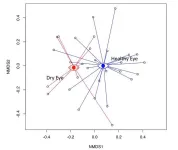(Press-News.org) Researchers have used advanced sequencing technology to determine how the mix of microbes present in patients with healthy eyes differs from the mix found in patients with dry eye. The new work could lead to improved treatments for various eye problems and for diseases affecting other parts of the body.
Microbial communities in and on our body — collectively referred to as the human microbiota — play an essential role in keeping us healthy. Although many studies have focused on microbial communities in our gut, understanding the microbiota present in other body sites is critical for advancing our knowledge of human health and developing targeted interventions for disease prevention and treatment.
“Once we understand the eye microbiota properly, it will improve disease diagnosis at an early stage,” said research team leader Alexandra Van Kley, a professor at Stephen F. Austin State University in Nacogdoches, Texas. “This knowledge can also serve as a catalyst for developing innovative therapies aimed at preventing and treating ocular disease as well as those that affect the central microbiome site: the gut.”
Pallavi Sharma, a graduate student in Van Kley’s lab, will present the research at Discover BMB, the annual meeting of the American Society for Biochemistry and Molecular Biology, which will be held March 23–26 in San Antonio.
“Human microbiome research suggests a strong connection between the gut microbiome and the brain and eyes,” said Sharma. “Any alteration in the gut microbiome affects other organs and can lead to disease. Therefore, we are trying to identify patterns of an imbalance between the types of microbes present in a person's ocular microbiome for people with different health problems.”
For the study, the researchers collected eye samples from 30 volunteers using a swab and then performed 16S rRNA sequencing and bioinformatic analysis to determine the microbiome distribution for patients with healthy eyes and those with dry eyes.
The analysis showed that Streptococcus and Pedobacter bacteria species were the most prevalent microbes in healthy eyes while more Acinetobacter species were present in the eye microbiomes of people with dry eye. “We think the metabolites produced by these bacteria are responsible for dry eye conditions,” said Sharma. “We are performing further research to understand the metabolic pathways associated with the Acinetobacter to better understand the disease.”
Next, the researchers would like to explore the gut microbiome of the patients with dry eye to better understand how it related to the eye microbe differences they observed.
Pallavi Sharma will present this research during a poster session from 4:30 to 6:30 p.m. CDT on Tuesday, March 26, in the exhibit hall of the Henry B. González Convention Center (Poster Board No. 277) (abstract). Contact the media team for more information or to obtain a free press pass to attend the meeting.
Note: Alexandra Van Kley is listed in the Discover BMB schedule as the presenter, but Pallavi Sharma will be presenting this work.
Image available.
About the American Society for Biochemistry and Molecular Biology (ASBMB)
The ASBMB is a nonprofit scientific and educational organization with more than 12,000 members worldwide. Founded in 1906 to advance the science of biochemistry and molecular biology, the society publishes three peer-reviewed journals, advocates for funding of basic research and education, supports science education at all levels, and promotes the diversity of individuals entering the scientific workforce. www.asbmb.org
Find more news briefs and tipsheets at: https://discoverbmb.asbmb.org/newsroom.
###
END
Bacteria that could help one of Africa’s staple crops resist a major pest have been identified by researchers at the University of California, Davis. Their findings, published March 26 in Cell Reports, could improve yields of sorghum, a mainstay of food and drink in West and East African countries.
About 20 percent of Africa’s sorghum crop is lost due to witchweed (Striga hermonthica), a parasitic plant that steals nutrients and water by latching onto the plant’s roots.
In the new study, UC Davis researchers show that soil microbes induce changes in sorghum roots that make the plant more resistant to infection by witchweed. They ...
Delaying surgical inguinal hernia repair in preterm infants until after discharge from the neonatal intensive care unit (NICU) appears to reduce the likelihood of serious adverse events, according to researchers at UTHealth Houston.
A study led by first and corresponding author Martin L. Blakely, MD, MS, MMHC, professor of surgery and pediatrics with McGovern Medical School at UTHealth Houston, analyzed the safety of early versus late surgical repair for preterm infants born with an inguinal hernia. The findings were published today in the Journal of the American Medical Association (JAMA).
“The biggest question we wanted ...
*Note - This is an early press release from the European Congress on Obesity (ECO 2024) Venice 12-15 May. Please credit the Congress if using this material*
Two plant compounds with potential as GLP-1 agonist weight loss pills have been identified in an AI (artificial intelligence)-based study, the European Congress on Obesity (ECO 2024) (Venice 12-15 May), will hear.
Glucagon-like peptide-1 (GLP-1) receptor agonists such as semaglutide and tirzepatide are highly effective at helping people lose weight. By mimicking the action of a hormone ...
East Hanover, NJ – March 26, 2024 – The shifting landscape of post-COVID-19 employment highlights a reduction in the gender employment gap among individuals with disabilities, a trend not observed among those without disabilities, according to last Friday’s National Trends in Disability Employment (nTIDE) Deeper Dive Lunch & Learn Webinar.
While men and women with disabilities have similar rates of employment, the data do not address whether women with disabilities in the workforce have lower-quality ...
Since its breakthrough development more than a decade ago, CRISPR has revolutionized DNA editing across a broad range of fields. Now scientists are applying the technology’s immense potential to human health and disease, targeting new therapies for an array of disorders spanning cancers, blood conditions and diabetes.
In some designed treatments, patients are injected with CRISPR-treated cells or with packaged CRISPR components with a goal of repairing diseased cells with precision gene edits. Yet, while CRISPR has shown ...
URBANA, Ill. – Most organic household waste ends up in landfills where it generates methane, a powerful greenhouse gas. Composting food and garden waste instead of sending it to landfills can significantly reduce methane emissions and help mitigate global warming. A new study from the University of Illinois Urbana-Champaign explores the effects of curbside compost collection programs in New South Wales, Australia.
“Governments around the world are interested in composting organic waste and reducing their methane emissions, and they are looking for ways to make ...
FOR IMMEDIATE RELEASE
March 26, 2024
Contact:
Jillian McKoy, jpmckoy@bu.edu
Michael Saunders, msaunder@bu.edu
##
Job Flexibility and Security Promotes Better Mental Health
A new nationwide study indicates that workplace policies that provide stability and flexibility to employees boosts overall well-being and encourages workers to seek health services when they need it.
Employment is a recognized determinant of health, and different aspects of a job can be beneficial or deleterious to mental health.
Job flexibility and job security, in particular, are key factors that contribute to employees’ ...
While Wyoming is home to some of North America’s most abundant populations of pronghorn that have largely been stable in recent years, a new analysis shows that many herds are experiencing long-term declines in fawn production.
Those declines are primarily a result of oil and gas development and encroachment of trees, according to researchers from the University of Wyoming, the University of Florida, the University of Nebraska-Lincoln, the University of Arkansas and the Northern Plains Agricultural Research Laboratory. Their findings have been published in the journal Global Ecology and ...
University of Wyoming researchers have gained further insight into how tardigrades survive extreme conditions and shown that proteins from the microscopic creatures expressed in human cells can slow down molecular processes.
This makes the tardigrade proteins potential candidates in technologies centered on slowing the aging process and in long-term storage of human cells.
The new study, published in the journal Protein Science, examines the mechanisms used by tardigrades to enter and exit from suspended animation when faced by environmental stress. Led by Senior Research Scientist Silvia Sanchez-Martinez in the lab of UW Department of Molecular Biology Assistant Professor Thomas Boothby, ...
HUNTINGTON, W.Va. – In a study published in the Annals of Family Medicine, researchers at the Marshall University Joan C. Edwards School of Medicine identify transformative effects of electronic health record (EHR) optimization on departmental productivity. With the universal implementation of EHR systems, the study sheds light on the importance of collaborative efforts between clinicians and information technology (IT) experts in maximizing the potential of these digital tools.
The study, led by a team of health care professionals in a family medicine department, embarked on a department-wide EHR optimization initiative in collaboration ...







